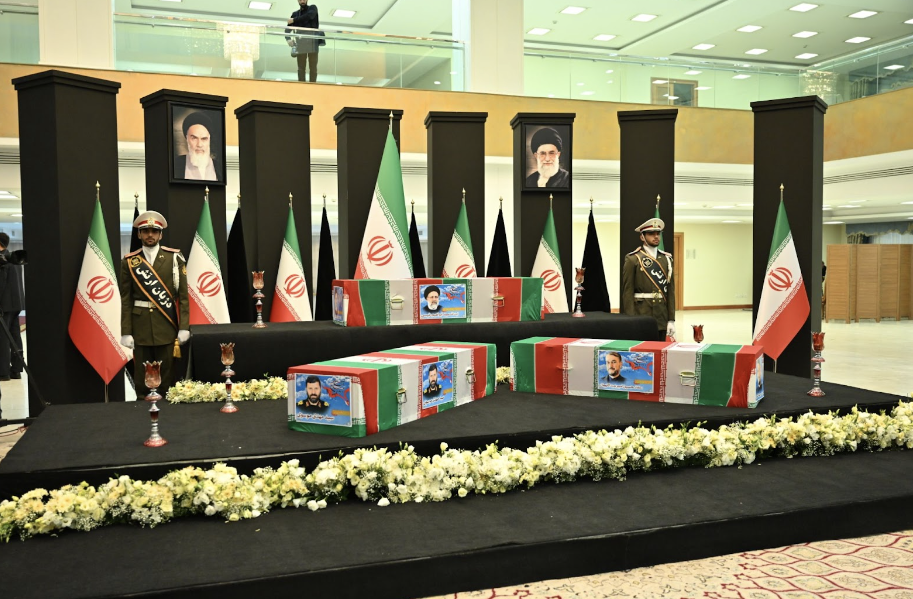Last month, Iranian President, Ebrahim Raisi passed away during a helicopter crash while travelling through thick fog in the mountains of northwest Iran. His premature death came amidst ongoing tensions in the Middle East, primarily caused by Israel’s War in Gaza, and after both Iran and Israel nearly brought the entire region into a regional war. The Iranian regime has announced that a snap election will be held on June 28th to determine the next president. Raisi, a hardliner, led Iran through major recent events such as COVID-19, the death of Mahsa Amini, and the current war in Gaza. Although Raisi’s death is one event amidst an atmosphere of tumultuousness and uncertainty that has gripped the Middle East since October 7th, it has immense ramifications for the future of Iran’s theocracy.
Raisi’s passing created a massive power vacuum that has yet to be filled but, most importantly, also raises questions concerning the aging Supreme Leader Ali Khameni’s succession. The Iranian Presidency is the only elected office within the Iranian state apparatus, second only to the Supreme Leader, but presidential powers are relatively limited and are checked by parliament. The Supreme Leader, currently Ali Khamenei, holds all the power in Iran, being the commander-in-chief of the armed forces, head of the Islamic Revolutionary Guard Corps (IRGC), and the sole individual able to decide the direction of Iranian foreign policy. For a long time, Raisi rose through the ranks of the clergy as Khameni’s apprentice. Raisi was President under Khamenei, just as Khamenei was Iran’s President under Supreme Leader Ayatollah Khomeini, the founder of the Islamic Republic. It may seem like the President is nothing more than a puppet of the Supreme Leader, a fabricated position conjured to display a facade of democracy. At the same time, the Supreme Leader holds all the reins of power within the Iranian state.
Ebrahim Raisi assumed the presidency in 2021. As president, he led Iran during a tumultuous period of public anger, a deteriorating standard of living, and increased hostilities with the United States. Notably, he led Iran when Mahsa Amini was murdered at the hands of Iran’s morality police; her death ignited a series of anti-government demonstrations against the repressive laws of the Islamic Republic. Protests raged for months, with women burning their hijabs and cutting their hair in protest. Raisi was instrumental in quelling these protests and other forms of dissent that emerged in the aftermath of Amini’s death. The movement came to an end in 2023 due to the armed forces’ unwavering fealty to the regime and the state’s control over the media. Around a total of 500 people were killed.
Furthermore, Raisi was not one to shy away from international confrontations. He showed steadfast determination in Iran’s pursuit of nuclear weapons but publicly stated that Iran was not interested in a bomb due to the US’s stance on the Joint Comprehensive Plan of Action (JCPOA). Most recently, Raisi led Iran through a standoff with Israel amidst its war in Gaza, now entering its ninth month. Iran and its allies within its Axis of Resistance, including the Houthis in Yemen, have been vocal in condemning Israel’s War in Gaza. In response to Israel’s actions, the Houthis have escalated their piracy operations in the Red Sea. In April, the Iranian Consulate in Damascus was struck, primarily attributed to Israel, killing a top commander, Major General Reza Zahedi. Iran then retaliated by firing 120 ballistic missiles, 170 drones, and more than 30 cruise missiles, with most intercepted by Israel’s Iron Dome defence system.
Raisi’s domestic and foreign policy largely fell in line with Khameni’s grand vision for Iran on the international stage, which is not surprising considering Raisi was Khameni’s protege. Although Khaemni’s succession is only opaquely discussed within a small circle of Iranian elites, it is evident that Raisi wanted to eventually assume the role of Supreme Leader after Khameni’s passing. Just as Khamenei served as president under Khomeini before becoming Supreme Leader himself, Raisi was seen as the most likely candidate to succeed Khamenei. Khamenei has yet to officially endorse a successor. However, with Raisi’s abrupt death, the question of who will succeed Khamenei is once again up in the air.
Mojtaba Khameni, a cleric and Ali Khameni’s second son, appears to be the heir apparent. Mojtaba has not been in the spotlight, but the regime has been accused of paving the way for his rise to power, which Khamenei has denied. Mojataba has been making moves on the political chessboard in the shadows since 2009 when he reportedly took control of the Basij militia used to suppress the protests during the election that year. Although it has yet to be confirmed whether Mojtaba will campaign for the presidency, it is almost certain that, whatever events unfold, Mojtaba will be in line to succeed Khamenei as Supreme Leader.
As of now, the presidency has been transferred to Mohammed Mokhber, who served as Raisi’s Vice President and is now acting president. Mokhber has been described as a pure bureaucrat, making it highly improbable that he will be endorsed as Raisi’s successor by Khamenei and other elite clergymen. Raisi’s succession is characterized by uncertainty, especially given the atmosphere of discontent within Iran due to widespread inequality partially caused by the government’s prioritization of defence spending. Any new president will have to contend with the shadow of the Masha Amini protests, which have put long-standing frustrations within Iranian society on full display. The upcoming elections this month could potentially reignite the prevailing discontent within Iran in the form of another popular uprising, in addition to the strenuous situation in the Middle East and the never-ending tensions with the Biden administration over the nation’s pursuit of nuclear arms.
For the upcoming presidential elections, six candidates, including parliament speaker Mohammed Bagher, have been approved to run so far. Bagher, a former mayor of Tehran with close ties to the Revolutionary Guard, remains the most prominent candidate. Masoud Pezeshkian is the only reformist candidate among a smorgasbord of hardliners, making it highly unlikely that he will stand a chance against the other candidates. Other rivals and moderates could also join the campaign trail, but they will probably not gain any substantial traction to emerge victorious.
The untimely death of President Ebrahim Raisi was a blow to the Iranian theocracy especially for Khamenei, who was grooming Raisi to be his eventual successor. Whoever succeeds Raisi as President does so with the full approval of the Supreme Leader, who wields absolute authority with full control over the police and armed forces, therefore, Raisi’s death will have little to no effect on the trajectory of Iran’s foreign policy; the nation will continue to pursue its nuclear ambitions while also trying to strengthen its Axis of Resistance to act as a buffer against the United States and Israel. However, the results of the upcoming elections could spark another wave of dissent similar to the popular uprising sparked by the death of Mahsa Amini last year. While Khamenei will continue to tighten his control over the nation with more extreme forms of state repression, and with the eventual ascension of his second son, Mojtaba, control of Iran will be firmly in the hands of Khamenei and his family. The future of Iran is filled with uncertainty, but it is almost certain that the Iranian people strongly desire to change the status quo but have lost any faith that it can happen through the ballot box.
Edited By Sofia Gobin

Bill Lin is entering into his third year at McGill University, currently pursuing a degree in B.A. in History and Political Science. Having spent his childhood in Oakville and his adolescence in China, he developed a profound interest in global politics. He decided to become a Staff Writer for Catalyst because his passion for geopolitics knows no bounds, as a writer he strives to share his unique perspective on a wide variety of pressing issues.

